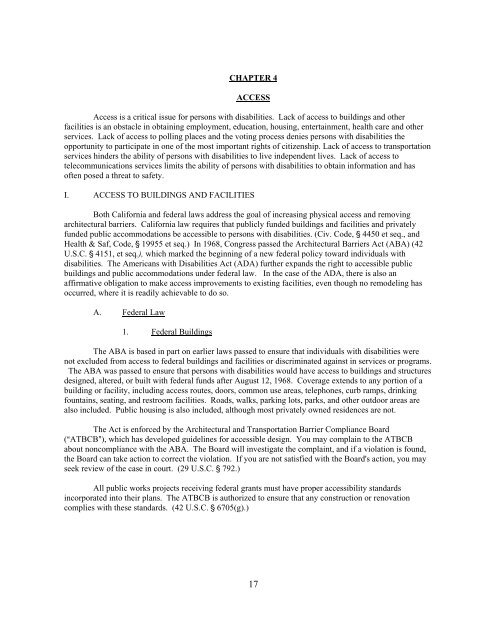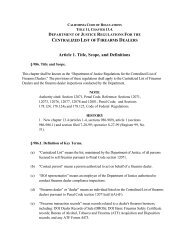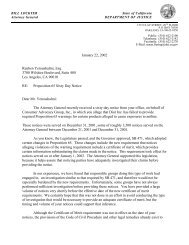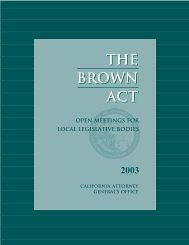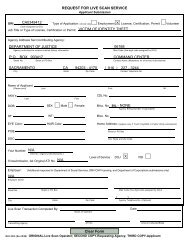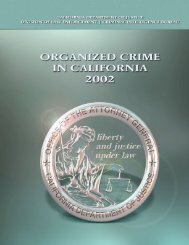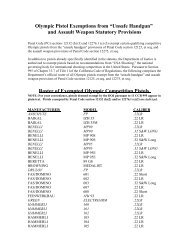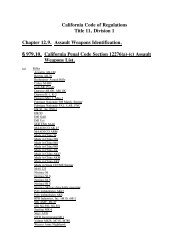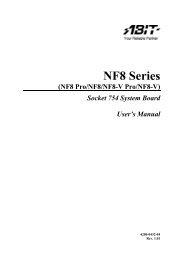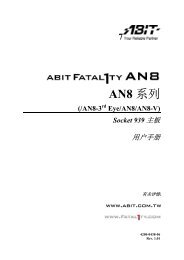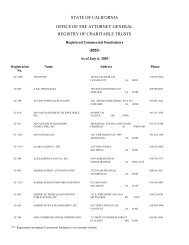Legal Rights of Persons With Disabilities - Ossh.com
Legal Rights of Persons With Disabilities - Ossh.com
Legal Rights of Persons With Disabilities - Ossh.com
Create successful ePaper yourself
Turn your PDF publications into a flip-book with our unique Google optimized e-Paper software.
CHAPTER 4<br />
ACCESS<br />
Access is a critical issue for persons with disabilities. Lack <strong>of</strong> access to buildings and other<br />
facilities is an obstacle in obtaining employment, education, housing, entertainment, health care and other<br />
services. Lack <strong>of</strong> access to polling places and the voting process denies persons with disabilities the<br />
opportunity to participate in one <strong>of</strong> the most important rights <strong>of</strong> citizenship. Lack <strong>of</strong> access to transportation<br />
services hinders the ability <strong>of</strong> persons with disabilities to live independent lives. Lack <strong>of</strong> access to<br />
tele<strong>com</strong>munications services limits the ability <strong>of</strong> persons with disabilities to obtain information and has<br />
<strong>of</strong>ten posed a threat to safety.<br />
I. ACCESS TO BUILDINGS AND FACILITIES<br />
Both California and federal laws address the goal <strong>of</strong> increasing physical access and removing<br />
architectural barriers. California law requires that publicly funded buildings and facilities and privately<br />
funded public ac<strong>com</strong>modations be accessible to persons with disabilities. (Civ. Code, ' 4450 et seq., and<br />
Health & Saf, Code, ' 19955 et seq.) In 1968, Congress passed the Architectural Barriers Act (ABA) (42<br />
U.S.C. ' 4151, et seq.), which marked the beginning <strong>of</strong> a new federal policy toward individuals with<br />
disabilities. The Americans with <strong>Disabilities</strong> Act (ADA) further expands the right to accessible public<br />
buildings and public ac<strong>com</strong>modations under federal law. In the case <strong>of</strong> the ADA, there is also an<br />
affirmative obligation to make access improvements to existing facilities, even though no remodeling has<br />
occurred, where it is readily achievable to do so.<br />
A. Federal Law<br />
1. Federal Buildings<br />
The ABA is based in part on earlier laws passed to ensure that individuals with disabilities were<br />
not excluded from access to federal buildings and facilities or discriminated against in services or programs.<br />
The ABA was passed to ensure that persons with disabilities would have access to buildings and structures<br />
designed, altered, or built with federal funds after August 12, 1968. Coverage extends to any portion <strong>of</strong> a<br />
building or facility, including access routes, doors, <strong>com</strong>mon use areas, telephones, curb ramps, drinking<br />
fountains, seating, and restroom facilities. Roads, walks, parking lots, parks, and other outdoor areas are<br />
also included. Public housing is also included, although most privately owned residences are not.<br />
The Act is enforced by the Architectural and Transportation Barrier Compliance Board<br />
(AATBCB@), which has developed guidelines for accessible design. You may <strong>com</strong>plain to the ATBCB<br />
about non<strong>com</strong>pliance with the ABA. The Board will investigate the <strong>com</strong>plaint, and if a violation is found,<br />
the Board can take action to correct the violation. If you are not satisfied with the Board's action, you may<br />
seek review <strong>of</strong> the case in court. (29 U.S.C. ' 792.)<br />
All public works projects receiving federal grants must have proper accessibility standards<br />
incorporated into their plans. The ATBCB is authorized to ensure that any construction or renovation<br />
<strong>com</strong>plies with these standards. (42 U.S.C. ' 6705(g).)<br />
17


